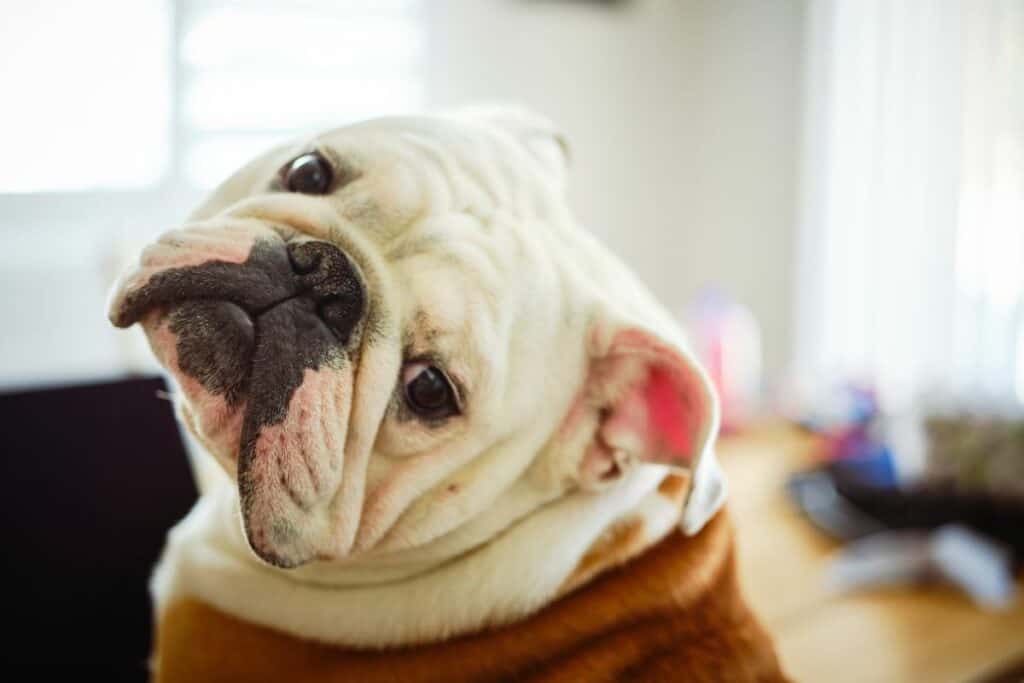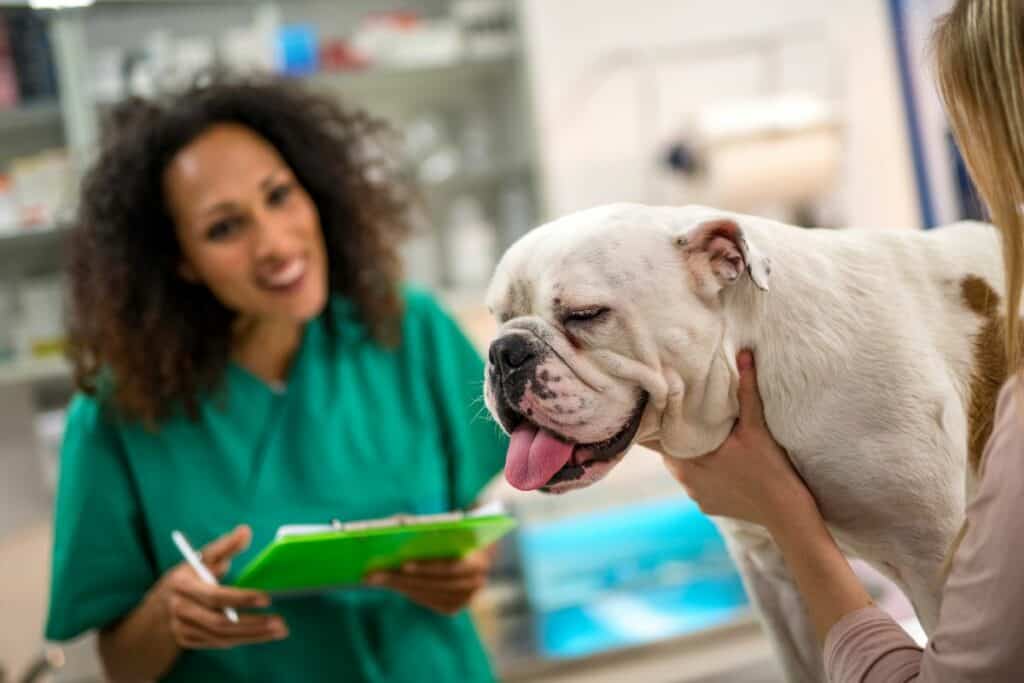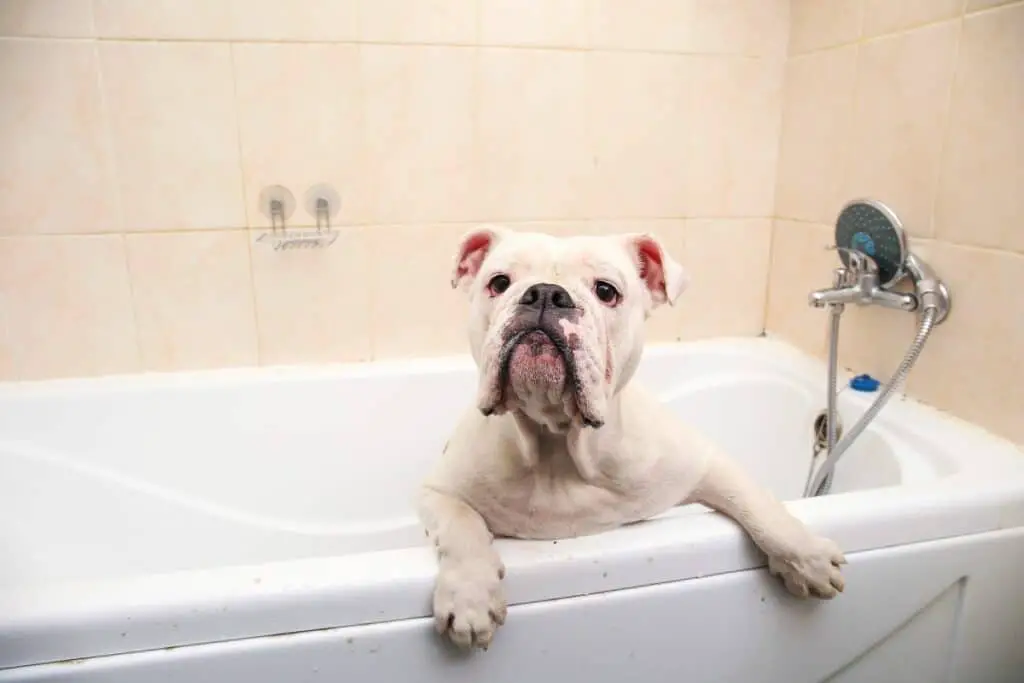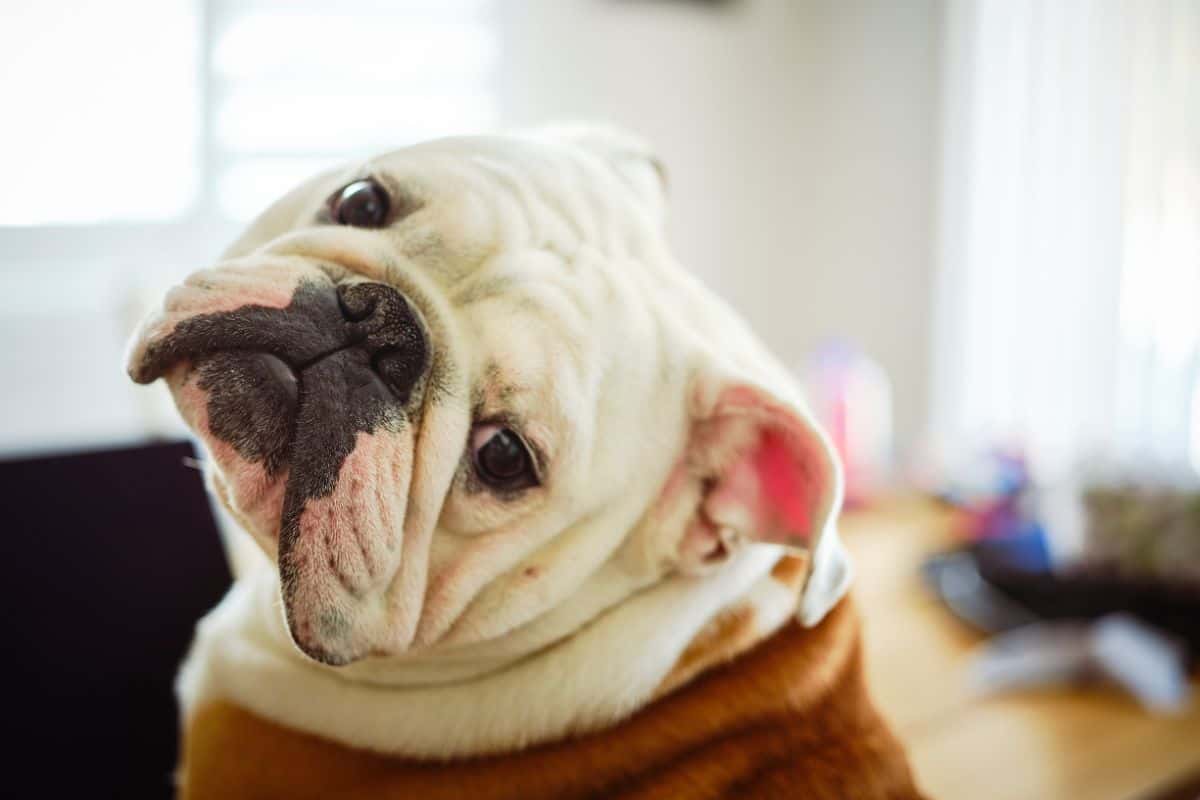Many English Bulldog owners struggle with their pups because they have bald spots and are usually unaware of why it’s normal to be concerned for your dog.
However, many reasons could lead to bald spots in dogs, and in this article, we will discuss all the reasons briefly to help you understand what your dog is going through.
So, why does my English Bulldog have bald spots? Your English Bulldogs has bald spots for many reasons, such as Hypothyroidism, allergy issues, rash, seasonal alopecia, parasites, black follicular dysplasia, Cushing’s disease, or generally poor health. If you notice bald spots in your English Bulldog, you should take your dog to the vet.
There is more to that answer; keep reading to learn more about why English Bulldogs have bald spots and how to treat them with home remedies.
Contents
Why Does My English Bulldog Have Bald Spots?

English Bulldogs can be prone to many health issues, and some of them can lead to bald spots, and it’s not uncommon in Bulldogs, so let’s get to know the reasons that could lead your English Bulldog to have bald spots.
- Hypothyroidism
- Allergy Issues
- Rash
- Seasonal alopecia
- Parasites
- Black Follicular Dysplasia
- Poor Health
- Cushing’s disease
Hypothyroidism
Hypothyroidism in dogs is a thyroid hormone deficiency, and it can lead to decreased metabolic rate and bald spots in your English Bulldog.
Signs of Hypothyroidism in English Bulldogs include:
- Excessive shedding
- Lack of energy
- Dull coat
- Sudden weight gain and obesity
- Thinning coat
- Dark pigmentation of their skin
- Cold intolerance
Treatment
If you think your English Bulldog has Hypothyroidism, you should take them to the vet to get the proper treatment.
Allergy Issues
Allergic reaction is one of the most common reasons some dogs have bald spots.
You should always consult their vet and determine if your dog is allergic to anything before setting up a diet or letting them near something specific.
Here are the signs of Allergies in English Bulldogs.
- Excessive itching
- Swelling of some body parts
- Constant licking
- Hives
- Bald spots
- Red eyes
- Dryness of the skin
- Inflamed skin
- Excessive biting and scratching
- Diarrhea
- Shortness of breath
- Vomiting
- Sneezing
- Runny eyes
- Chronic ear infections
Treatment
If you notice any or few of these signs, you should take your English Bulldog to the vet to check and find out what they are allergic to and help them avoid whatever it is.
However, if you already know what your dog is allergic to, you should try to make some changes in their lifestyle, whether it’s changing their diet, products, or the things they interact with.
Rash
Rashes can suddenly appear in dogs, just like how they appear in humans.
Many things can cause rashes in dogs, such as ticks, fleas, overheating, yeast, Demodex mites, fungal infections, poison ivy, flea allergy dermatitis, hormone imbalances, sarcoptic mange, and walking dandruff.
Allergies can also cause rashes, and that’s why checking that your English Bulldog doesn’t have any allergies or at least knowing and being aware of what they are allergic to is essential.
Signs of rashes in English Bulldogs include:
- Dry skin
- Scabs
- Redness in their skin
- Hair loss
- Crusts
- Discharge
- Scaly skin
- Red bumps
- Sores
Treatment
You should take your dog to the vet if you notice that your dog is suffering from these signs.
If you know why they have this rash caused by a toxic plant or something simple, then it’s more likely to disappear on its own. For example, if an insect bite causes it, then there is nothing you can really do except wait for the irritation to go and maybe consult a vet for something to soothe the pain and the itch.
Seasonal Alopecia
Seasonal alopecia is a skin condition that usually occurs in winter; it affects dogs’ skin and makes them lose patches of their hair.
The cause behind seasonal alopecia is still not determined, but it is believed that it can be caused by an abnormal response of hair follicles.
Signs of seasonal alopecia in English Bulldogs include:
- Bald patches around their abdomen and in front of their rear legs
- Hair loss around their chest and the tail
- Skin darker than usual
- Bald spots on their nose
Treatment
If they are suffering from seasonal alopecia, they will experience hair loss at the beginning of the fall and stop in the spring.
If you think that your dog has seasonal alopecia, all you should do is expose your English Bulldog to the sun every day if possible.
Parasites
Parasites are common issues in dogs, and you can’t prevent them before happening, but fortunately, the vet can quickly treat them. However, there are two types of parasites; internal and external, so you should know what you are dealing with before anything.
Internal parasites are tapeworms, hookworms, and roundworms; they can be transferred and affect the dog’s organs. Meanwhile, external parasites are ticks and fleas, and they live in the dog’s coat.
Signs of internal parasites in English Bulldogs include:
- Stomach pain
- Vomiting
- Swollen lymph nodes
- Stomach cramps
- Nausea
- Weight loss
- Diarrhea
- Continuous pain
- Constipation
- Eczema
- Persistent gas
Signs of external parasites in English Bulldogs include:
- Hair loss
- Inflamed and red skin
- Dry coat
- Fleas
- Excessive chewing
- Crusting and discoloration of their skin
- Restless behavior
- Lots of black debris in their ears
- Excessive scratching
- Scaly appearance in their fur
Treatment
It would be best if you did not try to give your English Bulldog something on your own to treat the parasites, and you have to take them to the vet for proper treatment.
The vet may give them a medical shampoo or can recommend an antiseptic shampoo.
Black Follicular Dysplasia
Black follicular dysplasia is a rare condition; the only way a dog can get it is by inheritance because it’s a genetic disorder. It only affects the black hair on the dog’s coat AND causes hair loss but doesn’t affect their overall health.
So, English Bulldogs with black follicular dysplasia will lose all their hair in any black-colored areas once they are nine months. their skin will also be more prone to bacterial infections.
Here are the signs of black follicular dysplasia in English Bulldogs:
- Shorter hairs
- Scaling skin
- Circular crust
- Skin infections
- Dry skin
- Itching
- Hair loss in black-colored areas
- Abnormal hair growth
- Dull coat
- Oily skin
- Red pus-filled skin pustules
- Flaky skin patches
- Darkening of the skin
- Skin odor
- Reddened skin areas
Treatment
Black hair follicular dysplasia cannot be treated, and it’s a permanent condition since it’s a genetic disorder.
If you think that your English Bulldog has black hair follicular dysplasia, then there is nothing you can do. However, if they have dry and itchy skin, or a foul odor coming from their skin, then you can take them to the vet.
The vet can recommend something to treat their dry and flaky skin, or you can find a good shampoo and conditioner for them that doesn’t irritate their skin.
Here are my top 3 shampoos that I use with my dogs when they have dandruff or dry skin.
Most vets usually recommend that one, especially in black follicular dysplasia or parasites, and it did wonderfully with all my dogs.
This one is my favorite, and it tends to use it with my dogs regularly without severe conditions.
It leaves them with a great smell that stays with them for a while after a bath, and it conditions their coat so well that and leaves them with smooth and shiny coats.
This is my backup shampoo, it’s the ideal shampoo for dogs with sensitive skin, and if your dog tends to itch excessively, this one’s for you.
Cushing’s Disease
Cushing’s disease is a severe health issue that occurs in dogs; it usually happens when their adrenal glands overproduce cortisol in their body, which can lead to hair loss. It can also be caused by a malignant tumor in the pituitary gland.
Here are the signs of Cushing’s disease:
- Lethargy
- Hair loss
- Increased appetite
- Thinning of their skin
- Muscle weakness
- Panting
- Frequent urination
- Excessive thirst
- Enlarged abdomen
- Excessive drinking
Treatment
You need to take your English Bulldog to the vet so they can do a physical exam and run a few tests on them to know what is causing their symptoms, to make sure that it’s not something else.
Poor Health
Your English Bulldog can have bald spots if they have poor health. It can be due to poor diet or underlying health issues, so it’s best if you find out why your dog has poor health in the first place so you can start the treatment.
Signs that your English Bulldogs have poor health include:
- Persistent vomiting
- Excessive drinking
- Change in their behavior
- Constant coughing
- Perceived lethargy
- Lack of appetite
- Visible pain
- Excessive urination
Treatment
You can take them to the vet to figure out if it’s due to a poor diet, then you need to switch to a more nutritious diet to provide them with everything they need.
You can also add omega-3 and omega-6 to their meals to improve their health, or if it’s a health issue, I’m sure that their vet will find the proper treatment for them.
Here are my top choices of omega-3 supplements for dogs.
This is my favorite supplement for my dogs, and I can see the difference it makes in their coats. I usually apply it on the top of their food, but you can give it to them between meals if you want. They only need it once a day, so choose a specific time and stick to it.
The Grizzly omega is also excellent for your pup; it leaves an immediate effect on your dog to the pure Pure Wild Alaskan Oil. I tried it a few times when the previous one was out of stock, and it’s pretty good.
When Is It Necessary To Take Your English Bulldog To The Vet?

It’s necessary to take your English Bulldog to the vet if you start noticing that other signs keep showing up or if there is a bad odor around the bald spots. You should always take the sudden changes in your dog’s behavior seriously, so as soon as your dog starts to eat less, be less energetic, or just behave oddly, you should take it to the vet.
Home Remedies For Hair Loss In English Bulldogs

If Your English Bulldog has bald spots and also losing hair all over its coat, then here are some home remedies that will help stop hair loss and promote regrowth.
Brush Them Regularly
Brushing your pup is essential for so many reasons. It decreases hair loss because the more tangled their hair gets, the more hair they will lose during the detangling process.
Just like us, dogs have natural oils as well that boost hair growth, and brushing helps to distribute the oils all over their coat.
So make sure to brush them at least three times a week, and it will be even better if you brush them every day. However, make sure not to bathe them too often because it can strip their natural oils and leave them with dry skin.
Apple Cider
Apple cider has many benefits and can be the ideal home remedy for many conditions that occur in dogs, such as bacteria and irritation.
You can apply a small amount directly to their skin. You can also add it to their shampoo or before shampoo, and then rinse it off and use the shampoo and conditioner as usual.
Olive Oil
You can also try olive oil. It’s one of the most magical things when it comes to taking care of the dog’s hair. It’s also great for moisturizing their skin.
Apply olive oil all over their coat and leave it for an hour while keeping an eye on your English Bulldog, then rinse it off with shampoo. The olive oil will smother any mites or parasites and leave your dog with a shiny and healthy coat.
Omega Biotics
Your English Bulldog may be losing hair due to a lack of vitamins and minerals, or they just need some supplements to boost their health a little bit, and that’s why all dogs need omega-3 or omega-6 in their diet.
Lemon Juice
If your English Bulldog is losing hair due to bacteria, then you should try lemon juice. However, if your dog is injured or their skin is irritated, then wait till there is nothing wrong with their skin, such as scars, cuts, red skin, or scratches, because the lemon juice will burn them badly.
Humidifier
You are probably thinking, what does this have to do with your dog’s hair loss? Well, the humidifier can prevent itchy and dry skin in dogs, and it can also soothe their skin, especially in the summer heat.
If you liked this article and found it helpful, consider sharing it with your friends and family, it may be helpful to them if their dog is suffering from the same problem. Also, if you have any questions, please don’t hesitate to contact us.
Related Questions
Can Stress Cause Hair Loss In Dogs?
Stress can cause hair loss in dogs, just like humans. If you notice that your dog is losing weight and you believe it is due to stress, then maybe you should check other signs of stress in dogs such as shaking, whining, panting, excessive yawning, and changes in their body posture.
Can I Put Coconut Oil On My Dog Bald Spot?
You can put coconut oil on your dog’s bald spot. Coconut can repair damaged skin and promote hair growth. It can also be used as a moisturizer if your dog has dry skin. Plus, it’s completely natural, so it doesn’t have chemicals that can lead to more damage.
Does English Bulldog Hair Grow Back?
The hair usually grows back; for example, if the hair loss was due to Flank Alopecia Seasonal Baldness, then all you have to do is expose them to the sunlight, and their hair will start growing back. Still, if the condition is Black Hair Follicular Dysplasia, unfortunately, it won’t grow back.


